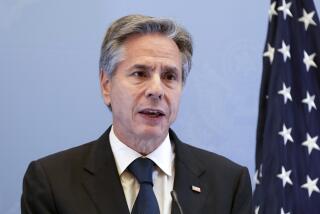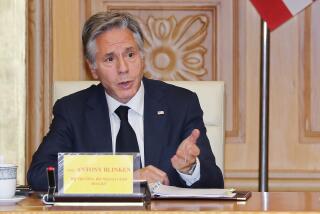Six nations agree on nuclear proposal to Iran
WASHINGTON — The United States and five other countries have agreed to offer a joint proposal to Iran at a high-level meeting next week in an effort to open a path for negotiations to curtail Tehran’s disputed nuclear program and to ease the threat of war.
When they meet in Baghdad on Wednesday, the six powers will offer to help Iran fuel a small reactor used for medical purposes, and to forgo seeking further United Nations economic sanctions.
In exchange, Iran would be required to stop enriching uranium to 20% of purity, which can be upgraded fairly quickly into fuel for nuclear weapons, and to surrender its stockpile of uranium already enriched to that level. The proposal also calls for Iran to halt operations at an underground enrichment facility near the city of Qom, which is relatively invulnerable to military attack.
The joint position eases concerns about rifts within the six-nation group, which has clashed over policy toward Iran in the past. But diplomats acknowledged that Iranian negotiators were highly unlikely to accept the opening bid unconditionally.
A deal would not immediately help Tehran achieve its main goal, which is getting the U.S. and Europe to lift sanctions on its oil and gas industry and central bank, and to cancel a European embargo on purchases of Iranian oil that is scheduled to take effect July 1.
Some diplomats say they will consider it progress if the Iranians agree to negotiate in detail over the proposal in subsequent meetings.
The current round of talks, which began April 14 in Istanbul, Turkey, have helped ease tension with Iran, but no one knows for how long. In Congress, both Democrats and Republicans have signaled that unless they see Iranian concessions soon, they are willing to impose new economic sanctions that may well drive the Iranians from the bargaining table, and could increase the risk of war.
The opening negotiating position was hammered out in recent secret discussions by the so-called P5 Plus 1 group: the United States, Russia, China, Britain, France and Germany.
Diplomats for the group have previously laid out elements they hoped to see in an interim deal, but not outlined their opening offer or won the blessing of the full group. They did not offer a proposal at the talks in Istanbul.
Secretary of State Hillary Rodham Clinton said this week that the group had reached a unified position that “sets forth what we would expect to see Iran do on what kind of timetable to reassure the international community that it is not and will not seek nuclear weapons.”
The support of Russia and China, which have often split with the West on Iran’s nuclear program, “is a significant statement that the rest of the world is placing on a peaceful resolution of this problem,” Clinton said in an interview with USA Today.
Helga Schmid, deputy to European Union foreign policy chief Catherine Ashton, met this week with Ali Bagheri, the No. 2 Iranian nuclear negotiator, to provide notice of the group’s opening position.
Russia and China had pressed other countries in the group to ease punishing sanctions on Iran. But recently they appear to have accepted that heavy sanctions, which have crippled Iran’s oil-based economy and are draining government coffers, are key to persuading Tehran to negotiate over its nuclear program, said people familiar with the diplomacy.
The six powers expect Iran to press hard for a quick suspension of the sanctions, but they insist that they will not easily give up their trump card.
“We won’t reverse the sanctions simply because of promises,” said one senior official, who declined to be identified discussing sensitive negotiations. “Verifiable confidence-building steps will be needed.”
The group’s negotiators face a difficult balancing act. They want to make full use of diplomacy to help lower the risk of war, which would drive up oil prices and imperil the fragile world economic recovery.
Yet diplomats understand that Iran may try to waste time while it presses ahead with a nuclear program that Washington and its allies believe could be used to develop a bomb-making capability.
Israel’sgovernment has repeatedly warned that it is skeptical of drawn-out talks and that it may bomb Iran’s nuclear installations if it sees insufficient progress.
Prime Minister Benjamin Netanyahu said Friday that he had seen “no evidence” that Iran was serious about stopping its nuclear program. He demanded a halt to all Iranian enrichment, the removal of all enriched uranium from Iran, and dismantling of the Qom facility.
The six powers have been most focused on the uranium enriched to 20% of purity because its elimination would slow the program and allow time for negotiations.
Diplomats believe Iran may be willing to halt that enrichment. Iranian officials have publicly suggested that they already have a sufficient stockpile, and that stopping further refinement at that level would not be viewed as a major concession.
Persuading Iran to ship its current stockpile out of the country, or to dismantle the expensive new underground facility near Qom, will be a far greater challenge. Unless they do so, however, those most suspicious of Iran’s intentions are unlikely to be satisfied.
More to Read
Start your day right
Sign up for Essential California for news, features and recommendations from the L.A. Times and beyond in your inbox six days a week.
You may occasionally receive promotional content from the Los Angeles Times.







